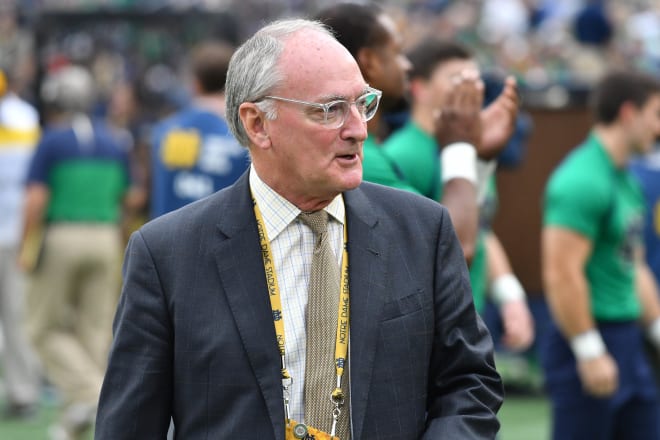Untangling ‘Eligibility Relief’ A Tough Challenge For Notre Dame, Others
The NCAA’s push to provide “eligibility relief” to the graduating student-athletes who unexpectedly had their spring seasons shut down because of coronavirus fears seems like a no-brainer at first glance.
But a brain surgeon might be needed to figure out exactly how to turn this concept into reality.
On March 13, the NCAA issued a public statement that all student-athletes participating in spring sports should be provided another year of eligibility to replace the one that was recently lost.

“Details of eligibility relief will be finalized at a later time,” the statement said in part, addressing the fact that this remains an NCAA initiative and has not been voted on or debated by its member conferences or schools. “Additional issues with the NCAA rules must be addressed, and appropriate governance bodies will work through those in the coming days and weeks.”
And that’s where this well-intentioned recommendation faces myriad of implementation obstacles.
First-year Notre Dame baseball coach Link Jarrett and his players were deeply impacted when the ACC initially suspended the spring sports season and subsequently canceled all events through the rest of this school year.
The No. 24 Irish were off to a tremendous 11-2 start and riding a seven-game winning streak when their season was scrapped.
Like most spring sports coaches, Jarrett doesn’t oppose eligibility relief if a student-athlete wants that option. That said, the devil is in the details.
“We have to evaluate what the NCAA can allow us to do from a roster standpoint, and an eligibility standpoint,” Jarrett said. “This is going to be the biggest process the NCAA’s ever encountered in terms of how they’re going to handle their recommendations and move.”
Jarrett believes that the ultimate fate of this NCAA suggestion will be considered, outlined and voted on at the institutional and conference levels.
Among the primary challenges Jarrett and other spring coaches face is how to handle the roster mayhem this relief recommendation will create if implemented.
Will programs be provided more scholarship money to allocate? Student-athletes in spring sports aren’t routinely provided a “full-ride” scholarship in the way the athletes competing in revenue sports such as football and basketball are.
Should roster sizes be increased for these spring sports programs at Notre Dame — including baseball, softball, golf, tennis, fencing, rowing and track and field — to account for the unexpected returnees?
How will graduate coursework look?
“That’s what the next several months will entail for all of us,” Jarrett said of working through these complex issues.
In a press conference last week, Illinois athletic director Josh Whitman pledged his support to this NCAA recommendation while at the same time he outlined the difficult logistics that reach beyond roster sizes and scholarship dollars.
“The situation we won’t likely be able to work through as much is an incoming baseball player who thought the stud center fielder was going to move on and that (starting spot) would be there for them to compete for,” Whitman said. “All of a sudden, that stud center fielder comes back and that changes the internal dynamic. That one is something we can’t deal with legislatively.”
Adding more tangle to this intricate initiative, some coaches and athletic directors want to provide this same eligibility relief to the winter sports athletes who completed their regular seasons but had their post-season tournaments canceled, sometimes mid-stream.
“I think any senior who had a championship opportunity taken away because of this should get another year,” said Florida athletic director Scott Stricklin. “…We’ll have that conversation. That makes a lot of sense and it’s the humane, fair thing to do.”
Notre Dame fencing coach Gia Kvaratskhelia might be the poster-coach for offering the graduating winter sports seniors another year of athletic eligibility.
Chasing their third national fencing title in four years, the No. 3 Irish were one of only three schools in the country (Ohio State and Princeton) to have qualified the maximum 12 athletes for the canceled NCAA fencing Championships.
Kvaratskhelia realizes that restoring a full year of eligibility is a long-shot for the winter sports programs that had already completed more than 90 percent of their competition this season.
“But at least that would provide some sort of remedy,” he said. “It would help to soothe the wounds after what they experienced in having the season stopped.”
----
• Talk about it inside Rockne’s Roundtable
• Subscribe to our podcast on iTunes
• Learn more about our print and digital publication, Blue & Gold Illustrated.
• Follow us on Twitter: @BGINews, @BGI_LouSomogyi, @BGI_MikeSinger and @AndrewMentock.
• Like us on Facebook.

